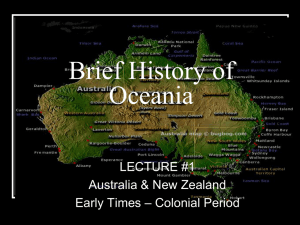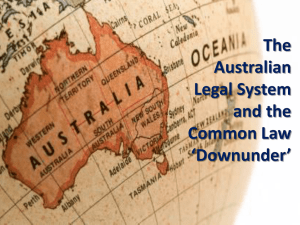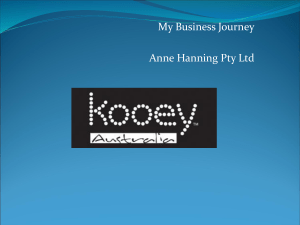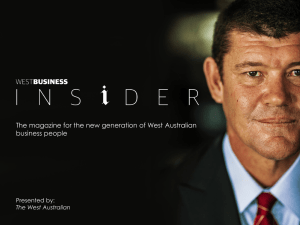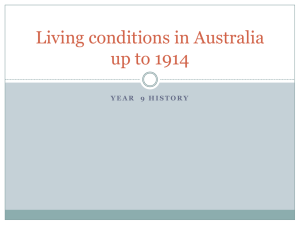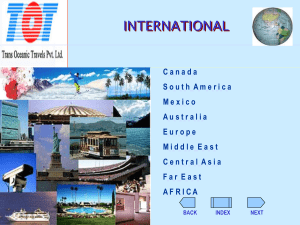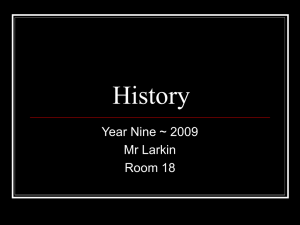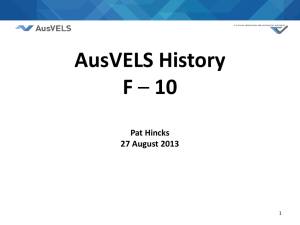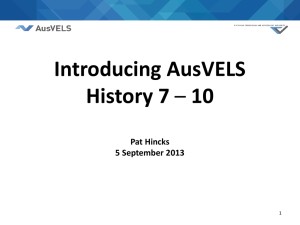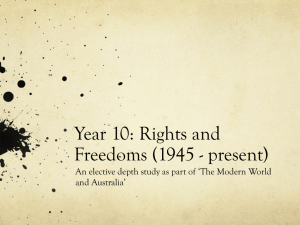Australia Day - A History 1788
advertisement
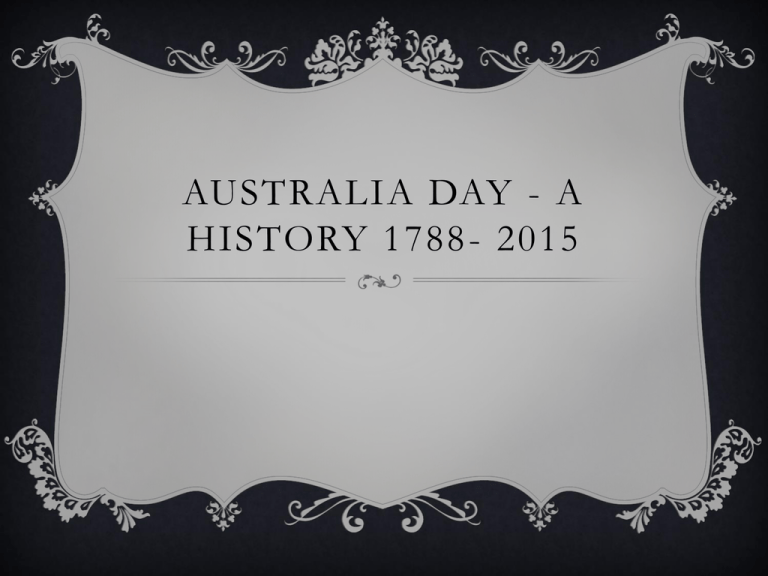
AUSTRALIA DAY - A HISTORY 1788- 2015 1788 - THE ARRIVAL OF THE FIRST FLEET:26TH JANUARY The First Fleet is the name given to the 11 ships, led by Captain James Cook, carrying over 1,000 convicts, marines and seamen that landed at Botany Bay in late January 1788. The landing followed a gruelling 250 day trip from England in search of a place to found a new penal colony, and the arrival marked the birth of what was to become Australia as we know it. 1817 – NEW HOLLAND Macquarie recommends to the colony's Governors that New Holland be renamed Australia 1818 – FOUNDATION DAY This celebration marks the 80 year anniversary of the First Fleet's arrival Did you know? Australia’s reputation as a sport-loving nation is almost as old as the country itself – in the 1820s, horse racing was a favourite pastime to celebrate the First Fleet landing, and in the 1830s regattas were widely attended 1826 – AUSTRALIA IS BORN The colony previously known as New Holland is officially renamed Australia 1838 – AUSTRALIA AT 50 In celebration of the 50th Anniversary of the First Fleet's landing, 26th January is officially pronounced a public holiday THANK THE ANA FOR AUSTRALIA DAY 'Natives' was the term now widely used to describe the nativeborn of European descent. The ANA, or Australian Natives’ Association, formed in 1871, campaigns for health care, and went on to fight for water conservation, the establishment of an Australian-made goods policy, and Indigenous issues. They are the driving force behind the establishment of a nation- wide Foundation Day 1888 – 1889: MELBOURNE ON THE WORLD STAGE The success and acclaim of international exhibitions in Paris and London are replicated on the other side of the world. The exhibition marks Australia’s progress as a blossoming centre of culture and industry 1901 – A NEW CENTURY, AN NEW FEDERATION The British Parliament passes legislation on January 1st allowing the six Australian colonies to govern in their own right as part of the Commonwealth 1905 – EMPIRE DAY The inauguration of Empire Day, on 24th May (the late Queen Victoria's birthday) is introduced to calm the fears of those who feared that a Federation would herald the end of Australia's close relationship with the United Kingdom 1914 – A WORLD WAR BEGINS The United Kingdom declares war on Germany. Australia, a close ally, pledges her support for the war effort and begins rallying troops AUSTRALIA AT WAR Australia's first major engagement in WWI was the Gallipoli Campaign. After landing at what became known as Anzac Cove on 25th April 2015, Anzac troops became embroiled in a bloody stalemate against Ottoman troops that was to drag on into early 1916 and cost over 8,000 Australian lives. After Gallipoli and the huge influence it had on Australia, Australia’s national day is changed to 30th July. Bitterness at forced conscription in overseas wars create division over Australia’s dual nationhood. 1938 – THE NATION CELEBRATES TOGETHER In 1930, a uniform date and time for Foundation is agreed upon across the nation after years of lobbying by the ANA, and in 1938, all six state premiers gather in Sydney for the first time to celebrate Foundation Day on the 150th anniversary of the nation’s founding. In February, the first Australian staging of the British Empire Games (now the Commonwealth Games) took place in Sydney INDIGENOUS AUSTRALIA AND INVASION DAY 1938 was also an anniversary of a very different kind. While these celebrations took place, the world watching, Indigenous peoples gathered in Sydney to protest generations of abuse at the hands of the settlers, and to demand a number of changes to the law, including giving them full citizenship. Since the English settlers had arrived in 1788, the Indigenous population of Australia – 10,000 year old cultures – had been systematically excluded from society, abused, killed and removed from their ancestral lands, until they became a profoundly mistreated minority in their own country. OUTSIDERS AT HOME Indigenous peoples had few rights, no access to health care or education, and were the victims of deeply rooted racism. Their plight worsened in the economic difficulties of the 1920s, and they were out of sight of most white Australians, who, living in Australia’s nascent urban centres, saw or understood little of their hardships. 1946 – AUSTRALIA DAY IS BORN Foundation Day is officially renamed Australia Day, thanks to the lobbying of the ANA for a united Australian celebration 1949 -AUSTRALIA WELCOMES NEWCOMERS In 1949, Australian citizenship - distinct and independent from British citizenship, becomes law. In addition, after WWII, large numbers of non-British immigrants began arriving in Australia from all over a recently war-torn world. In response, Australia ushers in a new era of inclusion, using Australia Day to symbolically welcome newcomers through naturalisation ceremonies – now known as citizenship ceremonies 1960 - CELEBRATING AUSTRALIAN EXCELLENCE In 1960, Sir MacFarlane Burnet was named as the first Australian of the Year. Burnet, born in Traralgon, Victoria, was an immunologist and virologist who over the course of his career became a world leader in immunology. In 1960, he won the Nobel Prize for Medicine for the discovery of acquired immunological tolerance, paving the way for successful organ transplants. A success now on the world stage, Burnet is made famous in his home nation as the first ever recipient of the Australian of the Year Award – an inspiring example of how far Australia had come, from colonial outpost to world leader. 1968 – LIONEL ROSE – A SPORTING INSPIRATION Just eight years after the first award was given, Lionel Rose became the first Indigenous Australian of the Year. Lionel was born and raised on an Aboriginal settlement near Warragul, Victoria, and in 1963 he won Australia’s amateur flyweight championship. In 1966 he won the Australian bantamweight title and by the end of 1968 he was champion of the world. His recognition as Australian of the Year is a significant victory for the Indigenous community 1979 – THE NADC The National Australia Day Council was formed and from its inception, encouraged local celebrations, working with Councils and communities across Victoria to celebrate Australia Day 1982 – AUSTRALIA DAY IN VICTORIA Inspired by the successes of the national Australia Day program, Victoria formed its own committee. Continuing to this day, the Committee organises the Australia Day activities in Melbourne, with favourites such as the Australia Day Parade, Luncheon and Fireworks 1984 – ADVANCE AUSTRALIA FAIR Discovering further its own unique character and that 'Australians all let us rejoice, of its citizens, Australia officially For we are young and free, changes its national anthem from God, Save the Queen We’ve golden soil and wealth for toil; to Our home is girt by sea; Advance Australia Fair, written in 1878 by Scottish-born Our land abounds in nature’s gifts Dodds McCormick. Of beauty rich and rare, In history’s page, let every stage This famous first verse captures Australia's natural Advance Australia Fair. wealth and beauty, and its peoples' strength In joyful strains then let us sing, and good nature. Advance Australia Fair.' 1988 – AUSTRALIA AT 200 1988 marks the Bicentennial anniversary of the landing of the First Fleet. Celebrations were hosted across the nation, with a re-enactment of Cook's landing taking place in Sydney Harbour, a touring Bicentennial Exhibition of Australian history, motor and air shows, and the Brisbane World Expo 88. Tensions remain high with Indigenous communities - although 1988 had been declared Year of Mourning in memory of the treatment of Indigenous peoples since colonisation, 40,000 people marched through Sydney during the Bicentennial demanding land rights for Aborigines and Torres Strait Islanders. 2000 – THE SYDNEY OLYMPICS The world watches as Australia takes on the 27th Summer Olympic Games, a huge international responsibility. The Games receive near-universal acclaim, with the organisation, volunteers, sportsmanship and Australian public being lauded in the international media. Australia's reputation as a spirited and warm-hearted country was here to stay 2001- ONE HUNDRED YEARS O F T H E AU S T R A L I A N F E D E R AT I O N Once again, celebration sweep the country on the centenary of Federation. From new centenary coins fresh from the Australian Mint, to marches, medals and memorialisation, the nation celebrates Australian history far and wide 2008 - RECONCILIATION In a famous and first-of-its-kind speech, Kevin Rudd acknowledges white settlers to be the source of the terrible hardships endured by Indigenous Australians for countless generations, including the Stolen Generation. The Apology to the Stolen Generation on 13 February 2008 is an important milestone, for many Indigenous and non-Indigenous people, in the Reconciliation process. 2015 – WHERE ARE WE TODAY? The date of 26th January for Australia Day has for many years been a object of discussion owing to the negative connotations for Indigenous communities, for whom the day is an annual reminder of the occupation of the country they had inhabited for tens of thousands of years and recalls the damage to their relationship with the land, culture, traditions and beliefs that followed. However, many Indigenous people are active within Australia Day committees today. Australia Day is an important annual opportunity to recognise the honoured place of Indigenous Australians in our nation's history, and to promote understanding, respect and reconciliation. WHAT DOES AUSTRALIA DAY MEAN TO YOU? Australia Day today is known as a community day. With formal ceremonies around the country - flag raisings, citizenship ceremonies and the presentation of community awards - combined with local events and fun activities, the day belongs to the people. Celebrations now include a strong festive aspect with special events encouraging the participation of the entire family and all members of the community. Australia Day committees involve their ethnic and Indigenous communities, service clubs, sporting and cultural organisations, and local government increasingly lends support to these events. Nationally, Australia Day celebrations are growing each year. An overwhelming proportion of Australians now view the celebration of our National Day as a significant and important event and actively participate in some way
